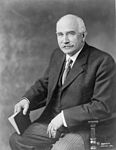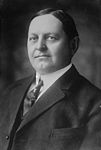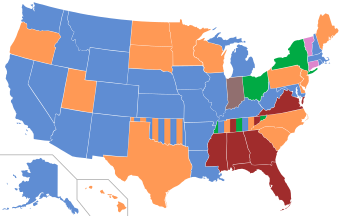| |||||||||||||||||||||||||||||||||||||||||||||||
1,088 delegates to the 1912 Democratic National Convention 726 (two-thirds) votes needed to win | |||||||||||||||||||||||||||||||||||||||||||||||
|---|---|---|---|---|---|---|---|---|---|---|---|---|---|---|---|---|---|---|---|---|---|---|---|---|---|---|---|---|---|---|---|---|---|---|---|---|---|---|---|---|---|---|---|---|---|---|---|
| |||||||||||||||||||||||||||||||||||||||||||||||
| |||||||||||||||||||||||||||||||||||||||||||||||
From March 19 to June 4, 1912, voters of the Democratic Party elected delegates to the 1912 Democratic National Convention for the purpose of choosing a nominee for president in the 1912 election.[1]
The primaries were inconclusive, with Speaker of the House Champ Clark holding a lead over Woodrow Wilson, but neither candidate close to the two-thirds of the delegates necessary to secure the nomination. In third place, Ohio governor Judson Harmon boasted the support of his home state and New York, the largest single delegation. House Majority Leader Oscar Underwood had strong support from the Deep South but little appeal outside the region.
At the convention, Wilson eventually secured the nomination over Clark after forty back-and-forth ballots.
Cite error: There are <ref group=lower-alpha> tags or {{efn}} templates on this page, but the references will not show without a {{reflist|group=lower-alpha}} template or {{notelist}} template (see the help page).
- ^ Kalb, Deborah (2016-02-19). Guide to U.S. Elections - Google Books. ISBN 9781483380353. Retrieved 2016-02-19.
© MMXXIII Rich X Search. We shall prevail. All rights reserved. Rich X Search






